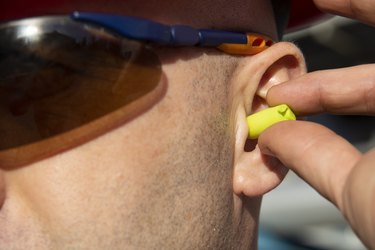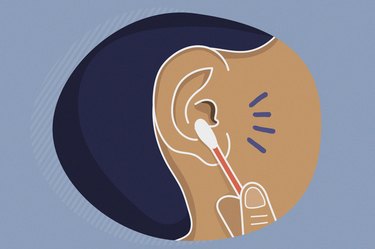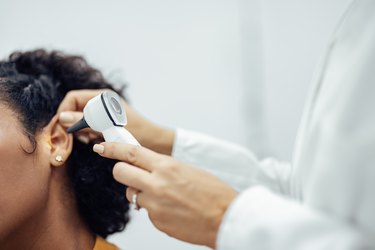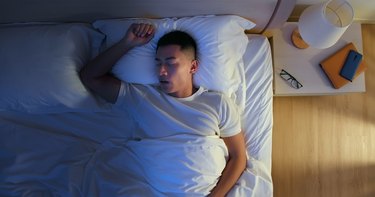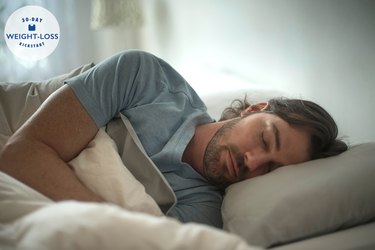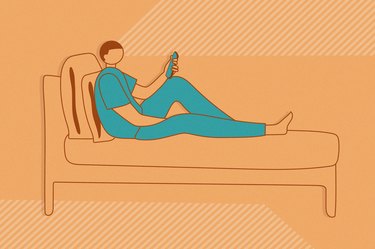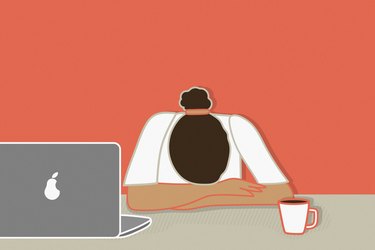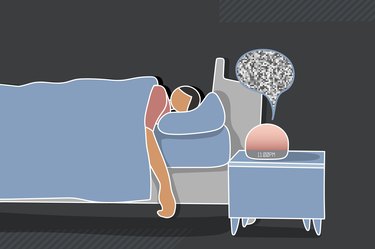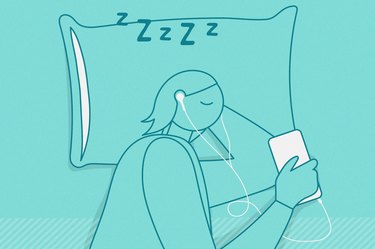
If you can't get to sleep — maybe your partner is snoring up a storm or thoughts are racing around your head — one option is to pop on some headphones, then turn on music, a podcast or (if you're really going after it) a meditation.
But if wearing headphones is a nightly habit, it's worth considering if it's harmful to your ears — or your shut-eye.
Video of the Day
Video of the Day
When it comes to how bad it is to sleep with headphones in, the answer, as with many things, is that it depends. It matters which type of headphones you're wearing — yes, some sleep headphones are better for your ears when laying down and sleeping than others — and what you're listening to.
Here's what to keep in mind before putting in earbuds at bedtime.
Possible Effects on Your Hearing
Let's tackle the auditory issue first: As long as you're not cranking up the volume too loud, listening to headphones should not hurt your hearing.
"There are published standards where noise is too loud for too long and damage can occur," says audiologist Emily J. Taylor, AuD, FAAA, of the Taylor Listening Center in Pikesville, Maryland.
Sounds that are at 70 decibels (dB) or lower are safe, while those above 70 dB can damage hearing if listened to long enough, according to the Hearing Health Foundation (HHF). For context, 30 dB is a whisper, 60 dB is some background music and 70 dB is average office noise. On the other hand, 80 to 85 dB noises — akin to a lawnmower or leaf blower — can damage your hearing after just two hours, according to the Centers for Disease Control and Prevention (CDC).
Scary though is just how loud headphones and earbuds can reach at their max volume: 100 dB, per the HHF, a level that damages hearing after just 15 minutes, according to the CDC. "Noise-induced hearing loss can cause permanent hearing loss and tinnitus, which is a ringing in the ears," Taylor says.
It's unlikely that you're listening to headphones on max volume while you're trying to sleep — you probably want a softer volume to soothe you. But keep in mind that there can be unexpected disruptions that play very loud over your headphones, such as weather warnings (e.g. tornado). Obviously, if you're already sleeping, this can wake you up.
In addition, you want to make sure that if you're wearing headphones, they do not prevent you from hearing what you need to hear at night — for instance, a baby crying, your alarm clock or a smoke detector.
Another factor: how long, in total, you're wearing headphones during the day. If you have headphones on all day for work and try to sleep in them, know that you should actually give your ears a break, Taylor says. If you wear earbuds, there's a risk that bacteria that collects on them can thrive and spread if your ears are also wet. She recommends keeping your headphones clean and following instructions provided by the manufacturer on how to do so.
Also, if you're prone to earwax impactions, wearing something in your ear, like an earbud, constantly throughout the day could make wax impactions worse, Taylor says.
Possible Effects on Your Sleep
Along with auditory issues, you'll also want to keep tabs on how the headphone habit is affecting your sleep — for good and bad.
It's possible that the type of headphones you're wearing could get uncomfortable during the night, and that discomfort may wake you up, says Julia Kogan, PsyD, a health psychologist and behavioral medicine specialist who focuses on stress and sleep. In addition, when you enter into lighter stages of sleep, fluctuating levels of noise can stir you awake.
What's playing out of those headphones matters, too. "Listening to a podcast to go to sleep is not the best choice, as we typically listen to these to learn something, which can activate your mind," Kogan says.
Meditation or deep relaxation apps are nice for relaxing your body and mind, and listening to a short five- to 10-minute meditation aimed at helping you drift off is unlikely to lead to sleep-related issues. That said, Kogan recommends meditating in a comfortable spot before getting into bed, rather than using them for sleep. Experts recommend that the bed is only used for sleep and sex because you don't want your brain to associate your bed with non-sleep activities that train you to stay awake, especially if you have issues with insomnia.
And it's always worth an internal dive to see if your headphones-to-sleep habit is a response to before-bed stress levels that feel out-of-control otherwise. To calm down spinning worries that keep you up at night, Kogan recommends spending five to 10 minutes an couple hours before bed writing down a to-do list the next day or designating that a set "worry time," where you write down worries and then how you will address them.
Deep breathing or progressive muscle relaxation exercises 30 to 60 minutes before bed can also help calm your mind and body for a restful night ahead.
3 Considerations When Sleeping With Headphones
Check the Volume
For ear safety, a good rule to go by is to go to 60 percent of the max volume on your phone — you can use the volume slider on your phone to get to this level, Taylor says.
Also check your smartphone settings. On an iPhone, this is located in the "Sounds & Haptics" setting. Your phone can measure headphone audio levels and send a notification when decibels are exceeded; you can also set your phone to keep sounds under a specific decibel level. With Android phones, look for "Media Volume Limit" within settings.
Consider a Sound Machine
Setting up a white noise machine will depend on if you have a bed partner (and how amenable they are to it). However, an external sound source can be a good way to drown out outside noises, help make tinnitus less noticeable and soothe you to sleep without needing headphones.
Get Help When You Need It
Step back, and think through why you're in the habit of popping on headphones for sleep. Is it because your partner is snoring and you can't get to sleep otherwise? They might benefit from a doctor evaluation to see if sleep apnea is behind their noisy sleep, Kogan says.
If you're sleeping with headphones to drown out ringing in your ears (tinnitus), see an audiologist for a hearing evaluation. About 25 million Americans have had tinnitus, according to the CDC — it's quite common. Taylor recommends seeing an audiologist for a baseline hearing test and to talk about other strategies for managing tinnitus rather than relying solely on headphones.
So, How Bad Is It Really to Sleep in Headphones?
As long as you keep the volume to a level of 60 percent, you can safely listen to something without the risk of damaging your hearing. If you wake up feeling rested, the habit likely isn't having a negative effect on your sleep, either.
However, it's also beneficial to examine why you got into the habit in the first place and address the underlying reasons (think: using stress management tactics) to see if those might help. If you need some noise, an external sound source, such as a white noise machine or app on your phone that plays white noise through the speaker, may be a better option.
Is this an emergency? If you are experiencing serious medical symptoms, please see the National Library of Medicine’s list of signs you need emergency medical attention or call 911.

